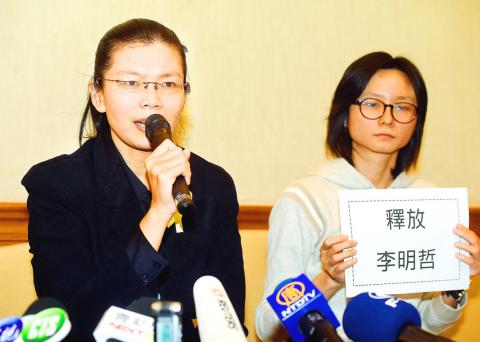Detained human rights advocate Lee Ming-che’s (李明哲) wife is to forgo the right to legal counsel and fly to Beijing in search of her husband, Lee Ching-yu (李淨瑜) said yesterday.
“Our government will put in the effort they will put in, but as a family member I cannot do nothing,” Lee Ching-yu told a news conference in Taipei. “I have to take action because every second and minute is torment for my husband.”
She said her decision had been made earlier the same day, adding that she had yet to inform the Straits Exchange Foundation.

Photo: Fang Pin-chao, Taipei Times
A former Democratic Progressive Party (DPP) staffer who works at Wenshan Community College in Taipei, Lee Ming-che went missing last week after entering Guangzhou on what his wife has said was a visit to share Taiwan’s experience of democratization with Chinese.
Beijing confirmed on Wednesday that he has been detained because of his “involvement in activities that threaten China’s national security.”
While family members and lawyers have a right to visit the detained under the Cross-Strait Joint Crime-Fighting and Judicial Mutual Assistance Agreement (海峽兩岸共同打擊犯罪及司法互助協議), China suspended its implementation of the agreement when President Tsai Ing-wen (蔡英文) took office last year.
The Chinese government has yet to announce what charges are to be brought against Lee Ming-che, Lee Ching-yu said, adding that she has decided against hiring a lawyer.
“Any legal defense is useless because China’s laws are not based on universal values,” she said, adding that she would focus on humanitarian concerns and human rights.
“I will not acknowledge any admission of guilt or other statement from my husband until I see him face to face, because it could be something forced from him by threats,” she said.
Beijing was chosen as her destination because Chinese authorities have yet to announce where Lee Ming-che is being held, she said, adding she would travel there “within the next few days.”

The Coast Guard Administration (CGA) yesterday said it had deployed patrol vessels to expel a China Coast Guard ship and a Chinese fishing boat near Pratas Island (Dongsha Island, 東沙群島) in the South China Sea. The China Coast Guard vessel was 28 nautical miles (52km) northeast of Pratas at 6:15am on Thursday, approaching the island’s restricted waters, which extend 24 nautical miles from its shoreline, the CGA’s Dongsha-Nansha Branch said in a statement. The Tainan, a 2,000-tonne cutter, was deployed by the CGA to shadow the Chinese ship, which left the area at 2:39pm on Friday, the statement said. At 6:31pm on Friday,

The Chinese People’s Liberation Army Navy’s (PLAN) third aircraft carrier, the Fujian, would pose a steep challenge to Taiwan’s ability to defend itself against a full-scale invasion, a defense expert said yesterday. Institute of National Defense and Security Research analyst Chieh Chung (揭仲) made the comment hours after the PLAN confirmed the carrier recently passed through the Taiwan Strait to conduct “scientific research tests and training missions” in the South China Sea. China has two carriers in operation — the Liaoning and the Shandong — with the Fujian undergoing sea trials. Although the PLAN needs time to train the Fujian’s air wing and

Taiwanese celebrities Hank Chen (陳漢典) and Lulu Huang (黃路梓茵) announced yesterday that they are planning to marry. Huang announced and posted photos of their engagement to her social media pages yesterday morning, joking that the pair were not just doing marketing for a new show, but “really getting married.” “We’ve decided to spend all of our future happy and hilarious moments together,” she wrote. The announcement, which was later confirmed by the talent agency they share, appeared to come as a surprise even to those around them, with veteran TV host Jacky Wu (吳宗憲) saying he was “totally taken aback” by the news. Huang,

The American Institute in Taiwan (AIT) put Taiwan in danger, Ma Ying-jeou Foundation director Hsiao Hsu-tsen (蕭旭岑) said yesterday, hours after the de facto US embassy said that Beijing had misinterpreted World War II-era documents to isolate Taiwan. The AIT’s comments harmed the Republic of China’s (ROC) national interests and contradicted a part of the “six assurances” stipulating that the US would not change its official position on Taiwan’s sovereignty, Hsiao said. The “six assurances,” which were given by then-US president Ronald Reagan to Taiwan in 1982, say that Washington would not set a date for ending arm sales to Taiwan, consult